#Russia 1812
Text
Ida meets Ney in Russia
I dimly remember that somebody (Cadmus?) mentioned they wanted to read more from Ida. So here’s a brief snippet of Ida – for once – getting in trouble with her hero, of Ney scolding her and … being jealous of Eugène?
The meeting takes place somewhen in late 1812 or early 1813, as much as it’s possible to tell from Ida’s chronological rollercoaster ride. In any case, after or at the end of the Russian retreat. Because of course Ida had joined the Russian campaign as well.
And not only she. If any tumblerinas here plan on learning how to time travel and want to go back to see the Grande Armée march towards Moscow, they don’t need to worry about incognitos. Most likely they would barely be noticed, as apparently there were wagonloads of groupies following their heroes around.
Okay: four. But that’s only those ladies Ida travelled with. Plus, two of them died on the way back.
Ida was particularly fond of a Polish-Lithuanian girl named Nidia, as madly in love with general Montbrun as Ida was in love with Ney. Not that either of the two got to see their idol much during the march. As a matter of fact, the first thing Nidia learned before entering Moscow was that Montbrun had been killed at the battle of Borodino. Other than that, Ida claims to have had a bad feeling about this city from the start:
As we entered Moscow, occupied at last by our troops, this immense city seemed to us like a vast tomb; its empty streets, deserted buildings and solemnity of destruction were heartbreaking. Despite the pomp of victory, I felt struck by I don't know what new kind of melancholy when I saw it; the flags seemed to me gloomy and almost surrounded by funeral crêpes and black forebodings. We were staying in Rue Saint-Pétersbourg, near the Miomonoff palace, which was soon occupied by Prince Eugène. The sight of this young hero and the cheers of the soldiers, who adored him, gave us back all the illusions of victory.
Okay, so I just added this because it’s so rare to see Eugène receive some praise. (I should also mention that the adored young hero was growing bald at an alarming rate and that his bad teeth were killing him.)
As a matter of fact, Ida claims that Nidia was especially interested in Eugène because he was rumoured to maybe become king of Poland (yes, another candidate). These rumours did really exist, Eugène mentions them in a letter to his wife before the campaign started. (And he also makes it pretty clear that these are just rumours and that he has not the slightest ambition to stay in this country. He may have used different vocabulary than Lannes but he didn’t like the region any better.)
The following night, Ida and Nidia wake up to a burning Moscow and are saved by soldiers of 4th corps. On the retreat, they seem to have followed headquarters as closely as possible, which was their safest bet to stay alive (because where the emperor is, there’s food and firewood and a resemblance of order) but still witness horrible tragedies. After the crossing of the Berezina, they apparently followed the remnants of Eugène’s 4th corps to Marienwerder, before Nidia says goodbye and goes back to defending Poland.
But before, on the way, at Valutina (?), Ida finally sees Ney again
At this point, after the retreat, Ida at least starts to question her decision to follow the Grande Armée around. Or something like that.
I have just recounted my fatigue, my difficulties and my perils in a war beyond human endurance, because of the new aspects it seemed to give to destruction and death. A powerful feeling made me undertake everything and endure everything. Why was I going to face the hazards of a campaign? Why was I going to expose the weakness of a woman to the rigours of a climate of iron? In order to obtain yet another glance from the one whose smile had always paid me for my military errands. This look was always like a world offered to my hopes; the dream alone of this reward had made possible all the impossibilities of time, distance, sex and fortune. My life was thus burnt for a few hours, still uncertain. I was giving up everything for a moment in space. Alas! this time, how I was going to regret this moment that had cost me so much to conquer! I had just gambled my existence for a flash of happiness, and this flash, the quickest of my life, became the cruelest.
I had to spend three fatal hours in a miserable shack on the outskirts of Volutina. My dress was so horrible that it was a real disguise. In a person dressed like that, one could hardly suspect a woman. Ney, however, only had to look my way to recognise me. To have been seen was enough to have been discovered. I was about to rush to the front of this first happiness; I was about to testify to the soul of my life how proud I was of this divination of friendship, of this perspicacity of memory, when words of an energy which was far from that of the feeling of which I was possessed, intimated to me the order of the most positive dismissal:
"What are you doing here? What do you want? Go away quickly."
With this address and a few short, curt rebukes about my reckless rage and my fury at following him everywhere, I only had the strength to reply: "It is a rage, indeed, but it is not at least the rage of pleasure or vanity," pointing to my coarse clothes and my face burnt by the sun and faded by fatigue. He took no notice of either the harangue or the costume. He was off and running. His displeasure at seeing me there was so great; he let it out so vividly that I thought he was going to push me back to the opposite bank of the Dniéper in his anger. Stunned by the reception, struck by lightning, I remained motionless for more than an hour, staring at him, thinking I saw him; he had disappeared without paying any more attention to me or worrying about me.
From which we can deduct that Ney was not a reader of Jane Austen novels. Otherwise he would have known that whenever you have behaved in a way that made a woman fall in love with you that’s f-ing your fault, monsieur!
In 1813, when I recalled to Marshal Ney this scene of such violent fury, followed by such cruel silence and abandonment, he told me that he had been so mortally frightened by the extravagance which had pushed me into the midst of so many perils and the licentiousness of an army, that he had even been tempted to beat me. Truth requires me to admit that the temptation had been so strong that he had, I believe, yielded to it a little; it was without his knowing it, for the great passions know neither all they want nor all they do. Anger is therefore still love, since it is as blind as fury.
Girl, get help. Seriously.
When we crossed the Dniéper at Serokodia, I could have had another word with him. A new laurel had just hidden his wrongs and healed my wound. I could have, I wanted to say to him: You have just added to your immortal glory here; you alone have just saved Frenchmen lost in deserts of ice; I would have liked to express to him what all parties repeat today, what posterity will proclaim on the ashes of the brave... But I stuck to the joy of hearing the distant cheers. There was then a little fear in my delirium for him, and I almost have the idea that I idolised him even more by fearing him in that way…
Did I mention the thing about getting help?
Yes, even the reproach was appreciated by my heart, and still seemed to me a tender interest. I found I don't know what pleasure in hearing myself scolded later for my association with Nidia, my marches and counter-marches with the Viceroy's troops. No matter how many times I told the Marshal that Eugène's protection had been focused exclusively on the young Lithuanian girl, and that I had slipped unnoticed into this benevolence, he took it into his head to believe nothing of these sincere protestations. To make him reconsider such a strongly conceived idea would have meant exposing myself to a repeat of the Dniéper order and military correction. I had no intention of trying the same pleasure twice. Finally, he saw the evidence of my attachment, and he found the generosity to prove this belated but strong conviction to me [...]
By calling her his brother-in-arms, by the way. And this, I believe, really meant a lot to Ida.
#napoleon's marshals#michel ney#ida saint-elme#memoirs#napoleon's family#eugene de beauharnais#russian retreat#russian campaign#russia 1812#also#we have a phone call by a certain vice-queen interested in the exact definition of the word “protection” in this particular context
45 notes
·
View notes
Text
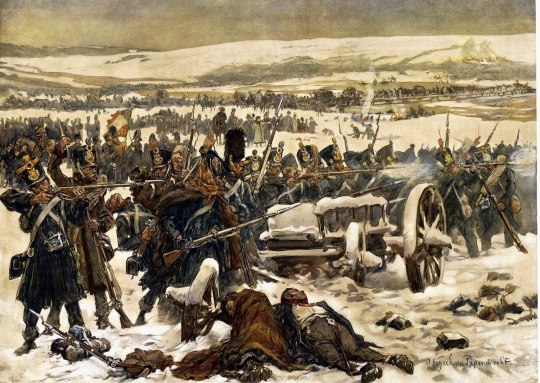
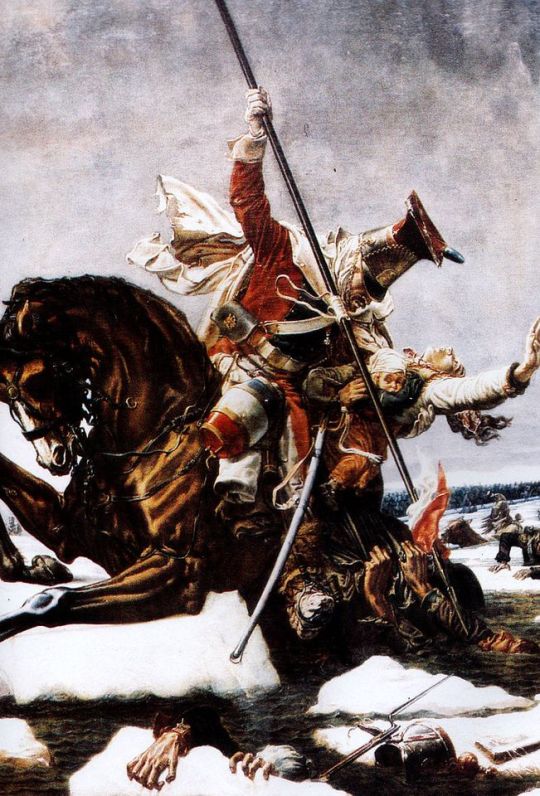



Berezina Retreat
Between 26-29 November, Napoleon's Grande Armee crossed the Berezina river at Borisov. The losses for Napoleon were great, more than 22,000 French forces would not make it to the other side of the river. Of these casualties, five of them were family members of mine (tragically enough four out of five were brothers as well). Despite the heavy losses, the crossing is seen as a logistic victory as Napoleon with the remnants of his army managed to escape and return to France.
As Napoleon's army reached Bobr, 50km away from Borisov, Napoleon was informed that the bridge at Borisov had been destroyed and the French garrison captured. At the same time a French cavalry brigade discovered a spot where they might be able to cross the river 13km north of Borisov. So on 25th November, the construction of bridges were started by mainly Dutch engineers. The water was close to freezing, only 40 of the 400 Dutch engineers survived the construction of the bridges.
To draw the Russian's attention away from the bridges being built, a diversion was undertaken by Oudinot's corps which led the Russians to believe that the French would either attempt to attack at Borisov and repair the bridge or cross the river south of the place. This resulted in the bulk of the Russian army moving southwards which enabled Napoleon to cross the army.
During the night of 26-27 November, the crossing began but the Russian forces also became aware of the French attempt and tried to return northwards, they were however stopped by Oudinot's battalions. By midday of the 27th, Napoleon and his imperial guard had crossed the river, Marshal Davout's and Prince Eugene's corps also managed to cross the river before the day's end. Meanwhile Marshal Victor's IX corps was given the order to defend against the approaching Russians in order to buy more time for the others to cross. Unfortunately the Dutch regiments were part of Oudinot's forces and most of them sadly died defending the Berezina crossing.
On 28th November, the Russian forces attacked Napoleon's army on both sides of the river. The crossing turned into a completely chaotic stampede as thousands of people, soldiers and stragglers rushed for the bridges. Some of the men tried to swim across the river which was a futile attempt since the water was so cold. There was a mad rush to cross the river since the stragglers knew that the temporary bridges would be destroyed, which happened at 08:00 in the morning on the 29th. tens of thousands of stragglers, both civilian and soldiers, did not manage to cross the river and were now at the mercy of the Russians.
As the bridges were set on fire, the Russians were no longer able to pursue the French army. The French retreat was therefore almost complete, with the Russians no longer on their tail and friendly territory nearby, the remnants of the army had escaped. The casualties were heavy, between 20-30,000 French soldiers died, the IXth corpse was hit particulary heavy as they lost half of their strength trying to protect the bridgehead. Besides the 20-30,000 military casualties, an additional 30,000 noncombatants died as well as result of the crossing and capture by the Russians. 40,000 French soldiers managed to cross the river, with Napoleon's imperial guard still being relatively intact.
Harking back on these relatives of mine, four out of five who died during the Berezina crossing were brothers, but there were other relatives of mine who participated in the Russia campaign, nine to be precies, of the 14 family members who served under Napoleon. Only two out of these nine relatives survived the Russia campaign, which is why those two are my 3rd great grandfathers and the other six are my 3rd great grand uncles as they all died young without partners or children. Here are the names of my relatives who died during the Berezina crossing:
Christiaan Daniels Nijhuis (third great grand uncle), served with the 125é regiment.
Hendrik Reeder (third great grand uncle), served with the 125é regiment.
Christiaan Daniels Nijhuis (third great grand uncle), served with the 125é regiment.
Johannes Reeder (third great grand uncle), Served with the 125é regiment.
Jean Mélard (fourth great grand uncle), served with the 48é regiment.
Here are the names of my other four relatives who participated in the 1812 Russia campaign:
Christiaan Reeder (third great grandfather), served with the 125é regiment and survived.
Jan Bakhuizen (fourth great grandfather), served with the Imperial guard as a red lancer, he survived though never returned to the army so was marked as missing in action.
Willem van Rijn (fourth great grand uncle), served with the 14é regiment cuirassiers, died during the Russia campaign possibly during the Berezina crossing on 28th November during Doumerc's charge.
Martinus van der Spek (first cousin 6 times removed), served with the 33é lights regiment but did not survive the campaign.

Images include: pictures of the crossing, a red lancer defending his family while crossing, Dutch engineers building the bridge in ice cold water, remains found at the Berezina during ww1 by German soldiers and a document of one of my five relatives who died at Berezina.
45 notes
·
View notes
Text
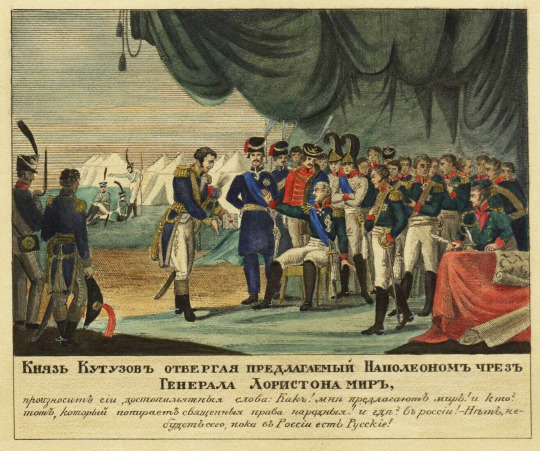
Napoleon's Ambassador Lauriston approaching Kutuzov in the Tarutino camp.
Maybe someone can translate the dialogue below the pic?
wikimedia
28 notes
·
View notes
Text
An ilirian solider and his wife 🥹💖


#napoleon#napoleonic wars#napoleonic era#digital illustration#ilirian provinces#ilirian uniforms#early 19th century#love#my heart 🥹#it would be a shame if he went to russia (its 1812)#late valentines day#marmont
70 notes
·
View notes
Text
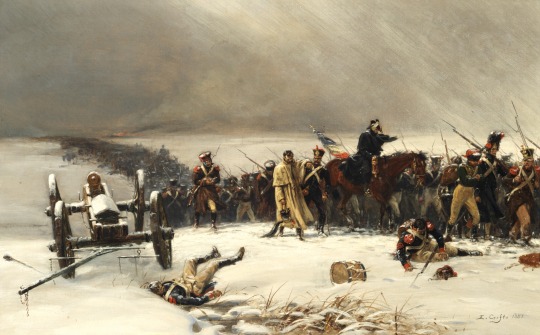
The Retreat from Moscow by Ernest Crofts
#ernest crofts#art#napoleonic wars#russia#france#french#invasion#history#napoleonic#winter#1812#europe#european#french empire#first french empire#soldiers#army#grande armée#snow#landscape
143 notes
·
View notes
Photo
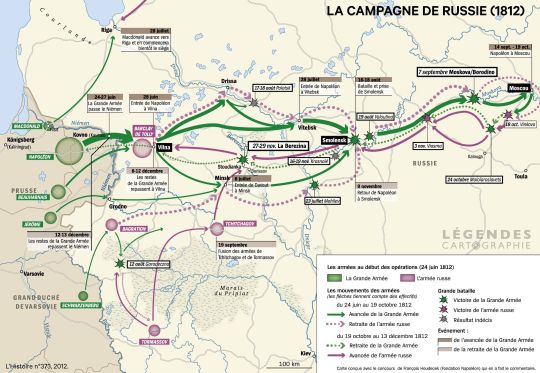
The Russian campaign of Napoleon, 1812.
by LegendesCarto
78 notes
·
View notes
Text
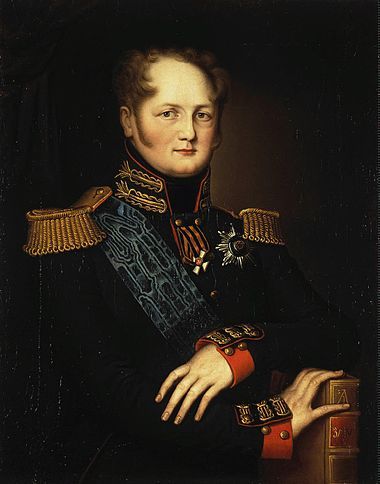

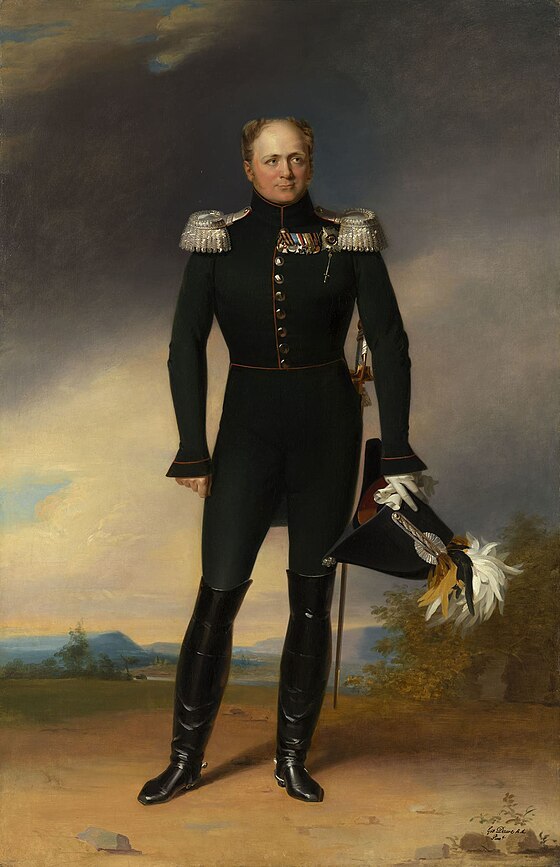
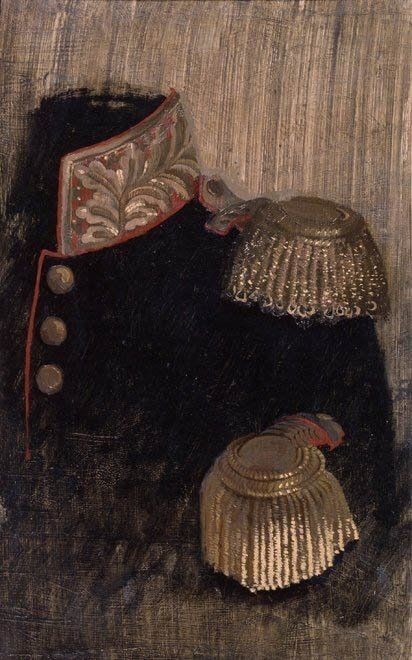
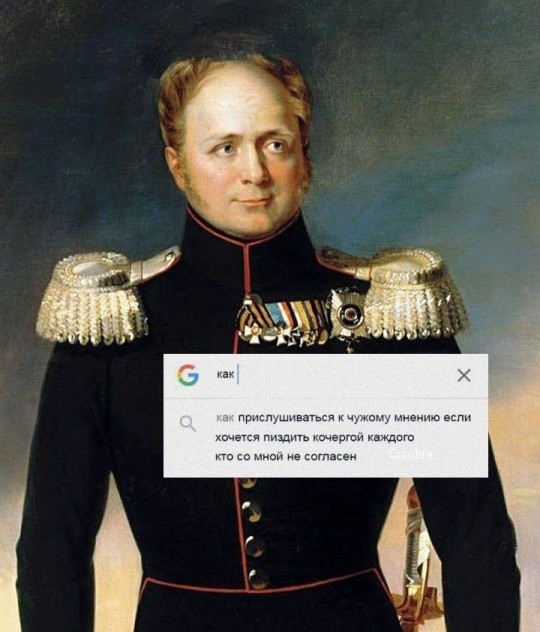

Кого я по-настоящему люблю и ценю, так это государя своего почтенного, Александра I. Готов выполнить любой его приказ. Да что приказ! За любимого своего государя готов на смерть идти!
Какое же это высокое и необъяснимое чувство un amour sincère et pur pour le puissant empereur
#war of 1812#19th century#война и мир#russian literature#nikolai rostov#alexander i of russia#alexander i#tsar alexander i#love#i love him#aesthetic
43 notes
·
View notes
Text

Решила нарисовать комикс по одному моменту из документалки. Пока наброски) Возможно, сделаю в диджитале)
#tsar alexander i#napoleonic era#napoleon bonaparte#alexander i of russia#napoleonic wars#war of 1812#alexander balashov
18 notes
·
View notes
Text
Fun Fact!
did you know, that in Nineteenth-Century Russia, they’d write letters? Yes, they’d write letters! They’d put down on paper what was happening in their minds. Once it was on paper they’d feel better, yes indeed, they’d feel better. It was like some kind of clarity when the letter was done and signed. In those letters, they might ask questions, like “Dear Andrey, dear old friend. How goes the war?” They might then go on to ask “Do we march on the French splendidly? Do our cannons crack and cry? Do our bullets whistle and sing? Does the air reek with smoke?” Before going on to express opinions, like “I wish I were there, with death at my heels.” Maybe they’d update their friends with news from their home, like saying “Dolokhov is recovering, he will be alright, the good man.” And mentioning loved ones, for example “And Natasha is in town, your bride to be, so full of life and mischief.” Before perhaps expressing their discontent with life, speaking about a sense of ennui that could be best described as an endless cycle of reading and drinking. However, they were much like us in that they were also prone to a conspiracy theory from time to time! Perhaps they had been studying the Kabal, and calculating the number of the beast, before coming to the conclusion that it was Napoleon! Perhaps they’d go on to vow that they would kill him one day, swearing that he was no great man, before admitting that none of us are great men, and that we’re caught in the tide of history; perhaps expressing philosophical views, like the viewpoint that nothing matters, or that everything matters, or that it was all the same. Yes, in Nineteenth-Century Russia, they’d write letters. They would indeed write letters. They’d put down on paper what was happening in their minds.
#natasha pierre and the great comet of 1812#letters#musical theatre#nineteenth century#russia#napoleon#war and peace
15 notes
·
View notes
Text
Russian Christ


Murder no one! But if you were to kill someday,
Then come, let us build a new church among the graves.
How good are words, are rituals worth to a corpse?
I didn't loot, i just collected what i chose!
I chose!
Come spread bright news to each room where one could be:
With his heart torn out and colder than ice,
Gold-clad, parading the lands that are doomed, here
Advances Russian Christ!
#russian history#alexander i of russia#history#russian empire#napoleonic era#napoleonic wars#alexander i#war of 1812#paul i of russia#Paul I#My art
11 notes
·
View notes
Text
Барклай-де-Толли, 1812

EN: Imagine Dragons, Enemy.
Tell you you're the greatest
But once you turn, they hate us
Your words up on thе wall as you're prayin' for my fall
And the laughter in thе halls and the names that I've been called
I stack it in my mind, and I'm waiting for the time
When I show you what it's like to be words spit in a mic
#collage#aesthetic#war of 1812#russia#barclay de tolly#imagine dragons#коллаж#эстетика#россия#napoleonic era#napoleonic wars#барклайдетолли#history#история#moodboard#мудборд
10 notes
·
View notes
Text
Letter from Laure Junot to her husband (1812)
This is for @impetuous-impulse and @snowv88: As promised, here’s the letter Laure Junot wrote to her husband in September 1812, when Junot was with the Grande Armée in Russia. It’s taken from the book "Lettres interceptées par les Russes", edited by Frédéric Masson (and of which I only own one of those Indian "reprints" that come down to a really bad scan and that I had rightfully be warned of before I bought it 😋. However, these pages are perfectly legible.)
For context: While the publication contains letters that normally did not reach their destination, as they were intercepted during the second half of the Russian campaign, this missive actually had been written during the first months of the invasion and had gotten to Junot safely. However, in his answer, Junot sent it back to Laure, and this answer then fell into the hands of the Russians. (I do not know what they were thinking. Because it’s rather private, and not pretty.)
Laure Junot, at the time when she wrote this letter, happened to be at a spa, at the same time as several other ladies of the court, off-duty empress Joséphine, Julie more-or-less-queen of Spain, Pauline Borghese and the crown princess of Sweden, Julie’s sister Désirée.
The Duchess L. of Abrantès to Junot, Duke of Abrantès. Aix [en Savoie], 7 September 1812
Your last letter caused me to feel both pain and pity. It comes from a fool, and from a fool all the more guilty for being so, as it depends on him to recover his reason and as he refuses to do so as stubbornly as if it meant his eternal misfortune. People dominated by an unfortunate passion are, in the beginning, like sick people who do not want to submit to the vigorous treatment that would cure them. And you want me to feel sorry for you! You want me to pity you! But do you deserve it? Yes, perhaps, but of this pity stripped of all esteem, for you are not the one to whom I promised to offer mine along with all my friendship as the prize for his noble efforts to deserve the name of man, by removing from his heart a feeling that he knows can never be happy. In this respect, you know my way of thinking. It is invariable, and nothing can change it. For many months I have spoken in the same terms to you, and I always will, because it is the language of both my heart and my reason. Perhaps it seems too harsh to you and you find me too frank. A more flirtatious person would no doubt be less so, but is it not better for me to refuse you a poison that would only aggravate your wound and to apply to it a balm that should, according to my desire, remove even the scar and only leave behind of its memory that which could, in the future, spread more charm over our friendship?
Whoa. Now that's a handfull. Please don't hold back, Madame! I have no clue (but would love to speculate!) what kind of "unfortunate passion" she refers to.
For a long time I had this ambition that almost all women have, this unbridled desire to attract attention and admiration, to inspire passionate feelings, to be a kind of divinity for everything around me. I paid for all these adulations with a look or a smile that often troubled the soul of the person to whom they were addressed, without stirring mine. Well, it is with bitterness that I remember this time in my life, and it would seem criminal to me now to encourage or give rise to a feeling that I could not share.
Is this a hint at her own wrongdoings, the affair with Metternich?
I am very happy to think that you are now close to your mother and your son. Give the latter all the time you can spare from your business and the duties you are obliged to fulfil. You have, you told me, great confidence in his tutor. But could strangers ever match a father's eye? Your abilities and your wit put you in a position to watch over his studies very closely yourself. May your loving attention also be focused on his young heart and his feelings. May he one day be able to return to you all the good things he possesses. Believe me, his virtues will be much dearer to him.
This passage confuses me deeply. How can she assume Junot is with his mother and his son in September 1812, when Junot is with the Grande Armée, and the Grande Armée in Russia since June? She must have known that, right? We'll see in the postscript that the ladies were informed of what was going on at the front. Also, the need she feels to interest Junot in his own child is so sad.
I'm leaving for Geneva the day after tomorrow, no matter how much the princesses insist that I stay. I haven't seen my children for three months now, and the need to be closer to them is becoming more pressing every day. I promised to go to Changrenon. I have to spend two days there, and from there I'll go straight to Paris, where I'll be very happy to see and embrace my children, the joy and glory of my life! Ah, when I look back on such moments, I no longer say that it is deprived of any happy future!
Which apparently otherwise she had said. - Also, as she says she will go to Paris to see her children, does that not imply that the son (who was five at the time, according to a footnote) was also there? Does that mean that in the passage above she supposed Junot to be in Paris as well? For that matter, was Junot's mother in Paris, or did she live elsewhere?
I hope that the first letter I receive from you will be good and reasonable, just as I want it to be. Many people take great pride in never changing their feelings. Do the opposite and put your pride in driving away from you those who now dominate you. It is only through weakness, believe me, that we retain an unreasonable inclination, and the word consistency is profaned when applied to madness.
Farewell, believe in my sincere friendship; nothing can diminish it, and one thing can increase it greatly: the certainty of being able to give it to you without fear.
This sounds more like a mother trying to reign in an adolescent. The use of the word "crainte" is also interesting. What precisely does she fear?
You ask me about my health. In truth, I don't know what to tell you, as I am still too ill to go and distress my friends by telling them about my sufferings. I'm still coughing up blood, and in the last six days I've had three new bouts of vomiting. There you have my bulletin.
P.S.: I am reopening my letter to tell you that I am no longer going to Geneva. Yesterday, after writing my letter, I received the bulletin of the 25th [August, of the Grande Armée in Russia, mentioning her husband]. You have probably read it, and you know me well enough to be convinced that this is not the moment I would choose for a pleasure trip. I'm also in a lot of pain; two hours ago, on my way back to the Empress's, I vomited so much blood that it could only be stopped by putting ice on my chest, so now I'm in so much pain that I can't breathe.
Does she try to imply that the army bulletin they received made her feel worse? I think it's the one mentioning Junot not quite being up to the job.
Also interesting: She adresses her husband by the formal "vous" throughout the letter. Which I believe was slowly going out of use but still not unusual in France, especially between spouses of high nobility. Still, this letter makes me feel as if Laure and her Andoche at this point already lived seperate lives. It sounds like one you would write to a husband you had recently divorced.
#napoleon's court#napoleon's generals#laure junot#jean andoche junot#russian campaign#russia 1812#smolensk 1812
37 notes
·
View notes
Text
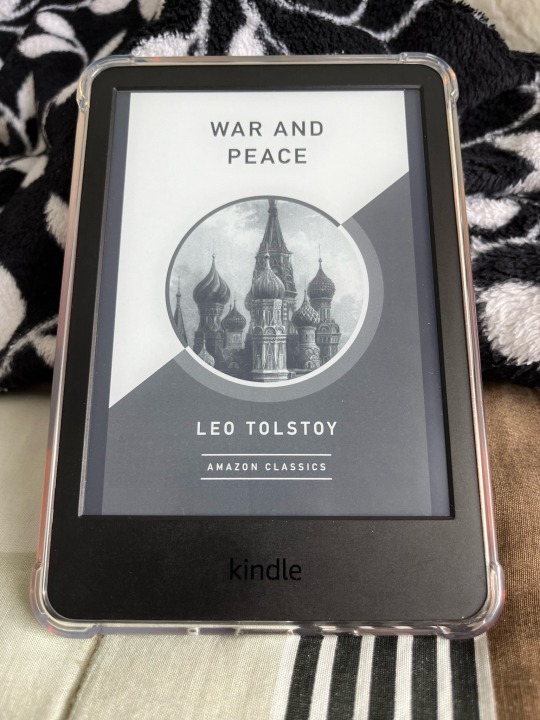
Looking into Napoleon's eyes Prince Andrew thought of the insignificance of greatness, the unimportance of life which no one could understand, and the still greater unimportance of death, the meaning of which no one alive could understand or explain.
#reading#books read in 2024#bookblr#books#book photography#book blog#bibliophile#books reading#books and reading#war and peace#leo tolstoy#tolstoy#prince andrew#princess mary#pierre#natasha rostova#petya rostov#sonya rostova#nikolai rostov#classic literature#russian literature#russian classics#a masterpiece#russia#war of 1812#god this was amazing#i loved every second of it#review#five stars#may reads
5 notes
·
View notes
Photo
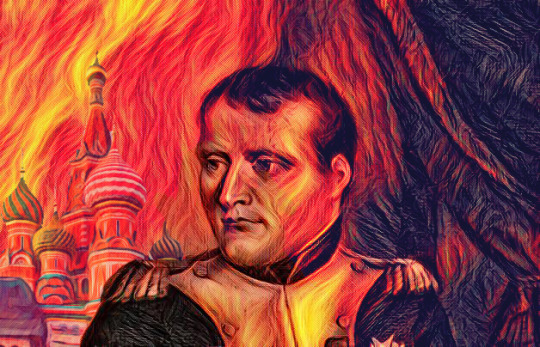
Bad ideas in history.
11 notes
·
View notes
Text
From Aleksandr Shirokorad:

(Rough) translation:
Thus, the question of whether Napoleon was an aggressor by inflicting a preemptive strike on Russia remains open.
History, as they say, does not tolerate the subjunctive mood, but, in my opinion, it is time for our historians to give an answer, and what would happen if Napoleon married the Russian Grand Duchess, and the tsar would lead the continental blockade in accordance with all the articles of the treaties, Fortunately, our thieves would still find a million loopholes in it.
Finally, the concentration of Russian troops could be carried out several hundred kilometers from the western border, and so on. And here it is more than obvious that it simply would not have occurred to Napoleon to climb into snowy Russia.
Even Academician Tarle warned against drawing analogies between 1812 and 1941 and between Napoleon and Hitler. The Fuhrer needed living space, he planned in advance the destruction of most of the Russian population, forbade his generals in advance to think about the possibility of reviving any kind of statehood in Russia after the destruction of the USSR.
But now Napoleon crossed the Niemen. What are the plans of this “treacherous aggressor”? Napoleon had only one thought - to defeat the enemy and make peace.
#Russian#book pic#Aleksandr Shirokorad#Алекса́ндр Широкора́д#БоГ ВОЙНЫ 1812 ГОЛА Артиллерия в Отечественной вомне#Alexander Shirokorad#Shirokorad#napoleonic#napoleon#napoleonic era#first french empire#19th century#french empire#napoleon bonaparte#history#france#frev#tsar Alexander#tsar Alexander I#Russia#Bog voyny 1812 goda. Artilleriya v Otechestvennoy voyne#book#tarle#Yevgeny Tarle#Тарле#Евгений Викторович Тарле
17 notes
·
View notes
Text
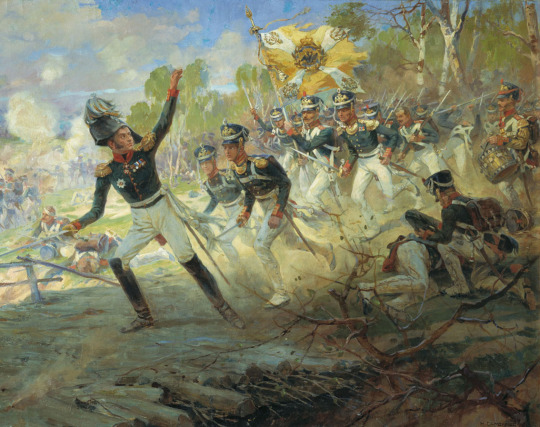
The Courage of General Raevsky by Nikolay Samokish
The Battle of Saltanovka depicting General Raevsky personally leading his men into battle, with his two young sons at his side.
#nikolay nikolayevich raevsky#battle of saltanovka#battle of mogilev#napoleonic wars#french#invasion#1812#france#russia#russian#soldiers#art#nikolay samokish#battle#war#europe#european#history#french empire#russian empire#patriotic war#patriotic war of 1812#sons#nikolay raevsky#alexander raevsky#combat#nikolai raevsky#aleksandr raevsky#painting#smolensk regiment
83 notes
·
View notes